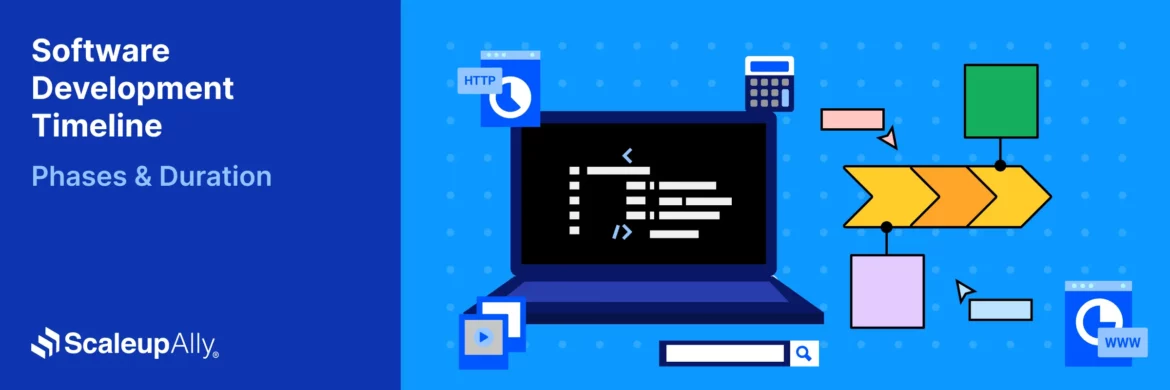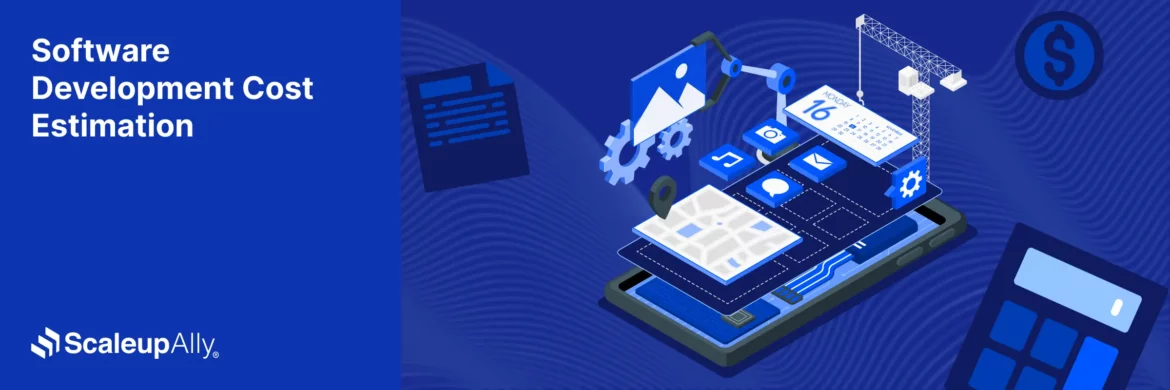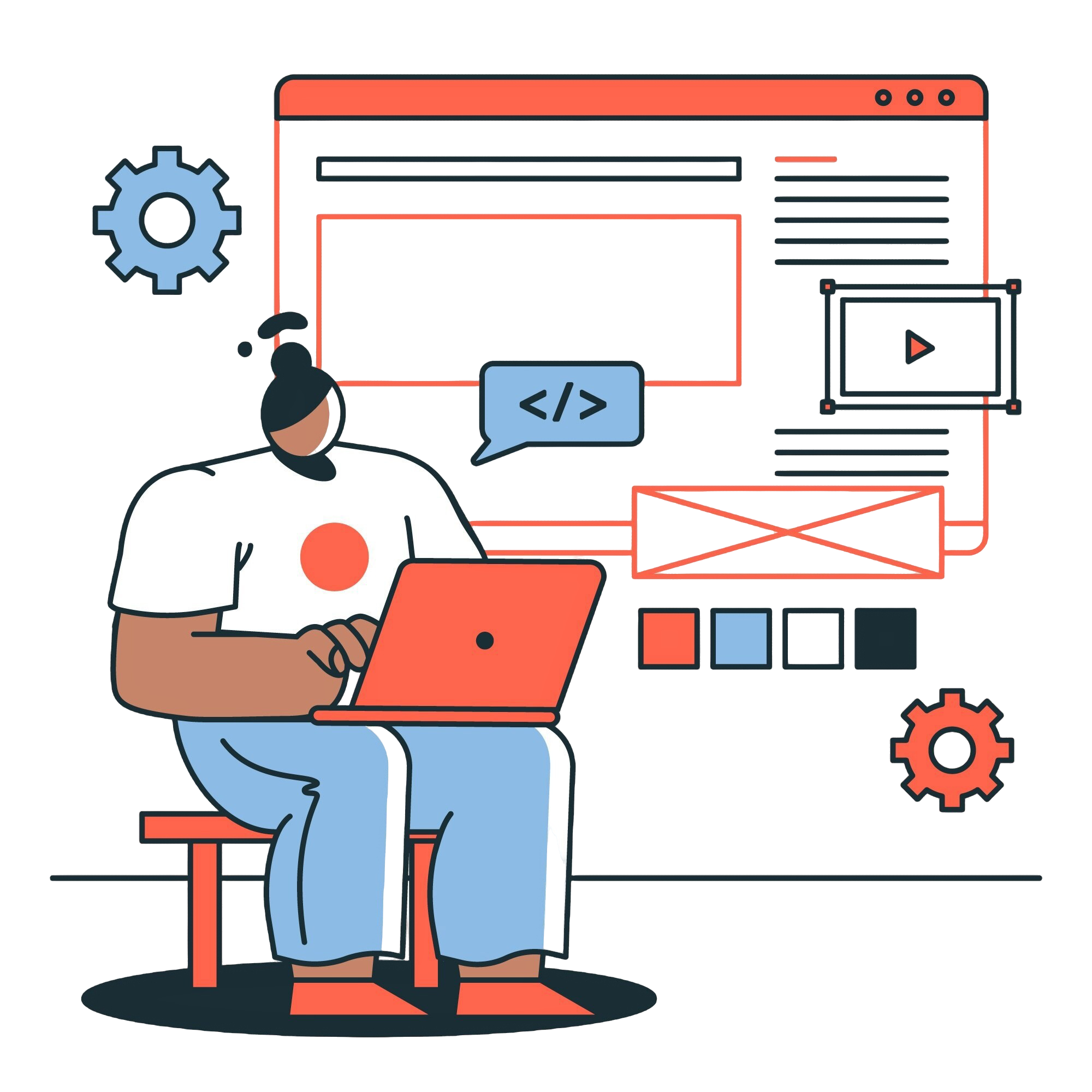
How long does it take to build an ecommerce website?
Manu Jain | June 1, 2025 , 12 min read
Table Of Content
Are you an entrepreneur or aspiring business owner looking to launch your own online store? Or maybe you already have an e-commerce business and are considering a website upgrade or redesign. Whatever your situation may be, one of the most common questions that arise is, “How long does it take to build an e-commerce website?”
The global ecommerce market size is expected to total $6.310 trillion in 2024.
In this comprehensive article, we will explore the factors that influence the development time of e-commerce websites and provide you with realistic timeframes for different types of projects. We’ll also compare the pros and cons of using e-commerce web builders versus custom e-commerce web development. So, let’s dive in!
Key Takeaways
- Development Time Estimates:
- Basic websites (e.g., Shopify): Days to 3–5 months.
- Moderate websites (e.g., Magento): 6–9 months.
- Complex websites (e.g., Amazon): 9 months to 1 year.
- Factors Affecting Development Time: Key factors include project complexity, platform choice, level of customization, product catalog size, integration needs, and content creation. Testing and legal compliance also influence timelines.
- Tips to Speed Up Development: Use pre-built platforms, prioritize key features, start with a smaller catalog, involve stakeholders efficiently, and adopt agile methodologies for faster iteration.
- Strategic Approach: Launching with a minimum viable product (MVP) allows businesses to go live quickly while improving and scaling over time.
Average Time to Build an E-commerce Website
- Average Time to Build an E-commerce Website
- Factors Affecting Development Time of E-Commerce Websites
- How Long Does It Take to Build an E-commerce Website?
- Comparison: E-commerce Web Builder vs. Custom E-commerce Web Development
- Tips for Speeding Up E-Commerce Website Development Process
- Conclusion
- Frequently Asked Questions
The average time to build an e-commerce website typically falls between 3 months and 12 months, depending on the complexity of the project. A basic online store built using platforms like Shopify or WooCommerce can take anywhere from 3 to 5 months. Moderately customized websites—such as those built on Magento or BigCommerce—generally require 6 to 9 months. For highly customized or enterprise-level ecommerce websites, the development timeline can extend to 9 months to 1 year or more.
These timeframes account for the entire process, including planning, design, development, testing, and launch.
Factors Affecting Development Time of E-Commerce Websites
The timeline for building an e-commerce website can vary widely depending on several key factors. Understanding these can help you plan more accurately and avoid unexpected delays. Below is a breakdown of the major contributors to development time, along with estimated durations based on typical project scopes:
1. Project Scope and Complexity
The overall scale of your website—number of features, business logic, and custom workflows—sets the baseline for development.
Estimated time impact: 2 to 12+ weeks
2. Platform Selection
Pre-built platforms like Shopify or WooCommerce can significantly reduce development time. In contrast, custom platforms or advanced Magento setups typically extend timelines.
Estimated time impact: 1 to 4 weeks (setup); longer if heavily customized
3. Customization and Design
Template-based designs can be deployed quickly, but fully custom interfaces require additional time for design, front-end development, and iteration.
Estimated time impact: 3 to 8 weeks
4. Product Catalog Size
Adding and optimizing a few dozen products is quick. Managing bulk uploads, categories, and metadata for hundreds of SKUs takes time, especially if done manually.
Estimated time impact: 1 to 6 weeks
5. Integration Needs
Third-party services like payment gateways, CRMs, shipping APIs, or inventory systems can vary in integration complexity. Each integration requires configuration, testing, and sometimes custom development.
Estimated time impact: 2 to 5 weeks
6. Content Creation
From product descriptions to policy pages, content must be written, reviewed, and sometimes translated. Visual assets like banners or videos also require additional time investment.
Estimated time impact: 2 to 4 weeks
7. Testing and Quality Assurance
Testing includes functional checks, responsive design validation, cross-browser testing, and performance optimization. The more complex the site, the longer this phase takes.
Estimated time impact: 2 to 4 weeks
8. Legal and Compliance Requirements
Implementing GDPR features, accessibility guidelines (WCAG), PCI-DSS compliance, and cookie notices can extend development—especially if these were not planned from the start.
Estimated time impact: 1 to 3 weeks
9. Project Team and Resources
Partnering with a team experienced in marketplace IT services can significantly streamline development for platforms that support multiple vendors or custom workflows. Limited staffing or outsourcing delays can add additional weeks to the development timeline.
Estimated time impact: Variable – depends on resource availability
10. Project Management
Projects with a clear scope, quick feedback loops, and milestone-based reviews stay on schedule. Poor coordination often results in overruns.
Estimated time impact: 1 to 2 weeks saved or lost depending on efficiency
Now that we have an understanding of the factors that influence development time, let’s move on to the specific timeframes for building different types of e-commerce websites.
How Long Does It Take to Build an E-commerce Website?
The time required to build an e-commerce website can vary depending on the complexity of the project. Here are some general timeframes for different types of e-commerce websites:
1. Basic E-commerce Website
A basic e-commerce website typically includes essential features such as product listings, shopping cart, payment processing, and user authentication. With the help of template-based e-commerce web builders like Shopify or WooCommerce, you can set up a basic online store in a matter of days. However, if you opt for custom development, it may take around 3 to 5 months to complete the project, considering factors like design customization, content creation, and testing.
2. Moderate E-commerce Website
A moderate e-commerce website is larger in scale and complexity, with additional features like integrated content management systems (CMS), blogs, forms, and calendars. Building a moderate e-commerce website may take around 6 to 9 months, as it involves more extensive customization, content creation, and integration of third-party services.
3. Complex E-commerce Website
A complex e-commerce website encompasses a wide range of features, including advanced functionalities like recommendation engines, search capabilities, and social media integration. These websites may require custom development from scratch or heavily customized solutions. The development time for complex e-commerce websites can range from 9 months to a year, depending on the specific requirements and level of customization.
| Type of E-commerce Website | Time Required for Development | Example |
|---|---|---|
| Basic E-commerce Website | Days to 3-5 months | Shopify, WooCommerce |
| Moderate E-commerce Website | 6 to 9 months | Magento, BigCommerce |
| Complex E-commerce Website | 9 months to 1 year | Amazon, Alibaba |
It’s important to note that these timeframes are estimates and can vary based on the factors mentioned earlier. Additionally, the availability of resources and the efficiency of project management can also impact the development timeline.
Comparison: E-commerce Web Builder vs. Custom E-commerce Web Development
When deciding how to build your e-commerce website, you have two main options: using an e-commerce web builder or opting for custom e-commerce web development. Let’s compare the pros and cons of each approach:
E-commerce Web Builder
Pros
- Quick setup: E-commerce web builders offer pre-built templates and easy-to-use interfaces, allowing you to set up your online store quickly.
- Cost-effective: Web builders typically have affordable pricing plans, making them suitable for budget-conscious entrepreneurs.
- Technical support: Most web builders provide technical support, ensuring you have assistance whenever you encounter any issues.
Cons
- Limited customization: E-commerce web builders have limitations when it comes to customization, making it challenging to create a unique and highly customized website.
- Scalability limitations: As your business grows, you may outgrow the capabilities of a web builder, requiring a migration to a more robust platform.
Custom E-commerce Web Development
Pros
- Unlimited customization: With custom e-commerce web development, you have complete control over the design and functionality of your website, allowing for a truly unique and tailored online store.
- Scalability: Custom development provides flexibility and scalability, ensuring your website can grow and adapt to your business needs.
- Integration possibilities: Custom development allows for seamless integration with third-party services, providing more advanced features and capabilities.
Cons
- Longer development time: Custom development typically takes more time than using a web builder due to the extensive customization and development process involved.
- Higher cost: Custom development can be more expensive upfront, as it requires skilled developers and additional resources.
Ultimately, the choice between an e-commerce web builder and custom development depends on your specific needs, budget, and long-term goals. If you require extensive customization and scalability, custom development may be the better option, despite the longer development time. However, if you’re looking for a quick and cost-effective solution, an e-commerce web builder can be a viable choice.
Tips for Speeding Up E-Commerce Website Development Process
If you’re looking to expedite the development process and launch your e-commerce website quickly, here are some tips to consider:
- Clear Project Scope: Define your project’s scope and requirements comprehensively from the beginning. This reduces the likelihood of scope creep and ensures that the development team can focus on essential features.
- Choose the Right Platform: Select an e-commerce platform that aligns with your project’s needs. Pre-built platforms like Shopify, WooCommerce, or BigCommerce can expedite development as they offer ready-made solutions.
- Utilize Templates and Themes: Leverage pre-designed templates and themes to accelerate the design process. Many e-commerce platforms offer a wide selection of themes that can be customized to match your brand.
- Prioritize Key Features: Focus on the most critical features that are essential for launching your online store. Additional features can be added in later phases, allowing for a faster initial launch.
- Simplify the Product Catalog: Start with a smaller product catalogue and gradually expand as your site gains traction. Reducing the number of initial products simplifies data entry and content creation.
- Agile Development: Use agile development methodologies that allow for iterative progress. This approach lets you launch a minimum viable product (MVP) quickly and then improve it over time.
- Efficient Stakeholder Involvement: Ensure that key stakeholders are actively involved and provide timely feedback during the development process. Efficient communication can prevent delays due to misunderstandings.
- Continuous Monitoring and Optimization: After launch, keep monitoring and optimizing your e-commerce website. Regular updates and improvements should be an ongoing part of your strategy.
- Scalability Planning: Build a website that is scalable, so it can handle growth in the future without major overhauls. This forward-thinking approach avoids rework in the long run.
By implementing these strategies, you can significantly reduce the time it takes to build your e-commerce website while ensuring a successful and efficient launch.
Conclusion
Building an e-commerce website is a complex process that requires careful planning, development, and testing. The time required to build an e-commerce website varies depending on factors such as project scope, customization needs, platform selection, and content creation. While basic websites can be set up relatively quickly using e-commerce web builders, more complex and customized websites may take several months to a year.
When deciding between an e-commerce web builder and custom development, consider factors such as customization options, scalability, and long-term business goals. Both approaches have their pros and cons, and the choice depends on your specific needs and budget.
Regardless of the development approach, there are strategies to speed up the process, such as clear project scoping, utilizing templates, prioritizing key features, and efficient stakeholder involvement. Continuous monitoring and optimization are also crucial for the long-term success of your e-commerce website.
Remember, building an e-commerce website is an investment in your business’s online presence and growth. With careful planning, the right development approach, and the support of a skilled ecommerce development partner, you can launch a successful and profitable online store.
Frequently Asked Questions
Q. How can I expedite the development process of my e-commerce website?
To speed up the development process, consider strategies such as clear project scoping, utilizing templates, prioritizing key features, and efficient stakeholder involvement. Continuous monitoring and optimization are also crucial for a timely and successful launch.
Q. Should I use an e-commerce web builder or opt for custom development?
The choice between an e-commerce web builder and custom development depends on your specific needs, budget, and long-term goals. Web builders offer quick setup and affordability, while custom development provides unlimited customization and scalability.
Q. How can I ensure the success of my e-commerce website?
To ensure the success of your e-commerce website, focus on factors such as user experience, security, performance, and continuous optimization. Regularly monitor analytics, update content, and adapt to changing customer needs and trends.
Q. Is it possible to launch an e-commerce website on a tight budget?
Yes, it is possible to launch an e-commerce website on a tight budget. E-commerce web builders offer affordable pricing plans, and careful planning and prioritization of features can help you stay within budget. Additionally, starting with a smaller product catalogue and gradually expanding can also help manage costs.
Related Blogs

Top 20 Emerging Technologies of 2026
Discover the top 20 emerging technologies of 2026. Explore which innovations are driving change across healthcare, finance, manufacturing, and other crucial industries.
ScaleupAlly Team
Dec 16 ,
9 min read

Software Development Timeline: Phases, Duration & Estimation Guide
Understand the software development timeline with phase durations, key factors, hidden delays, and practical methods to estimate project time.
Suprabhat Sen
Nov 29 ,
16 min read

Software Development Cost Estimation Guide: What’s Included & What Affects the Price
Explore software development cost components, major pricing factors, and practical estimation methods to plan your project accurately from start to finish.
Suprabhat Sen
Nov 29 ,
14 min read



